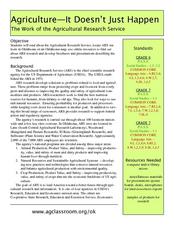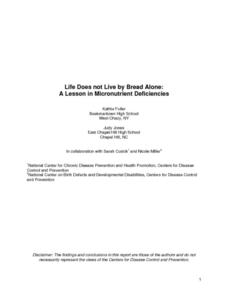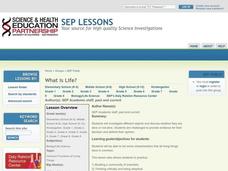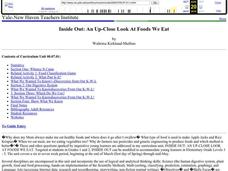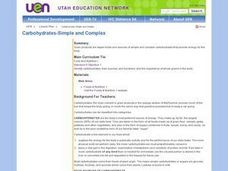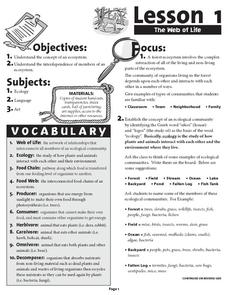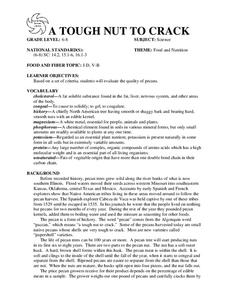Curated OER
Agriculture - It Doesn't Just Happen
Sixth graders examine the role of the US Department of Agriculture. In this United States Agriculture lesson, 6th graders create maps with sites and specialty areas. Students create a presentation on the topic they were given to research.
Curated OER
Secrets of the Ocean Realm - Survival in the Sea
Students determine the sequential links in a marine food chain and identify the roles that various organisms play in this chain. Students develop charts as visual aids for illustrating marine food chains.
Curated OER
Life Does Not Live By Bread Alone
Students investigate the relationship between micronutrients and proper metabolic function. The instructional activity should serve as an introduction to the subject. The subject of the function includes the study of plants, animals, and...
Curated OER
What is Life?
Students investigate the characteristics of living things. For this life science lesson, students examine several living and non-living specimens. Students determine which things are living and non-living.
Curated OER
Next Year's Seeds
Fifth graders explore genetic traits. In this genetic traits lesson, 5th graders discover how traits are passed from parent to offspring while examining plants. Students problem solve real world applications.
Curated OER
Algae Experiments
Students describe the characteristics of algae. In this biology lesson, students perform a series of experiment to explore algae. They investigate the basic things algae need to survive.
Curated OER
Inside Out: An Up-Close Look At Foods We Eat
Fourth graders identify the origins of meats and vegetables consumed by humans on a daily basis. They classify foods (meats, dairy products, grains...) and create a food pyramid.
Curated OER
Food Web Mystery
Students describe typical marine food webs, and explain why food is generally scarce in the deep-ocean environment. They discuss reasons that seamounts may support a higher density of biological organisms than would appear to be possible.
Curated OER
Learning From Leaves: From Observation to Inference
Students examine the adaptation of plants to their environments. They analyze and observe the structure, shape, and internal structure of various leaves, and make inferences about the structures.
Curated OER
Carbohydrates - Simple and Complex
Students examine simple and complex carbohydrates. They take notes and complete a worksheet. They also research cookbooks and find recipes which shows the simple and complex carbohydrate groups.
Curated OER
LET YOUR FINGERS DO THE WALKING
The student will recognize different information sources. 2. The student will use a telephone book as a resource for locating agricultural businesses
and people with agriculture-related jobs.Discuss the purpose of the phone book, and...
Curated OER
Food Safety and Quality Assurance
Students identify and interpret how milk is processed and learn important concepts in food safety and quality assurance. They identify how milk is processed, the importance of food safety, and the quality assurance process. Students also...
Curated OER
Determination of the Physical Properties of Dietary Fibers
In this dietary fibers learning exercise, learners compare and contrast the properties of different fibers: cellulose, hemicellulose, pectin, guar, agar, and xanthan gum. This learning exercise has 5 short answer questions.
Curated OER
Soil Management
Fourth graders examine different opinions on soil management. In this soil management lesson, 4th graders use a variety of resources to research how agriculture and the environment are related. They investigate cause and effect...
Curated OER
Case of the Missing Pumpkin
Fourth graders explore holidays by participating in a pumpkin activity. In this vegetation lesson, 4th graders discuss the different uses for pumpkins, not just Halloween decorations. Students identify the nutrients pumpkins need to...
Curated OER
Vermicomposting
Fourth graders explore insect life by viewing a soil presentation in class. In this composting lesson, 4th graders read assigned text about the process of composting soil and the necessity of soil in plant life. Students view video clips...
Curated OER
Soil Isn't a Dirty Word
Learners investigate the properties of rocks. In this geology lesson, students draw their profile and discuss what a soil profile would look like. Additionally, learners demonstrate how to make soil by rubbing two pieces of sandstone...
Curated OER
Rosa Parks Community Garden
Ninth graders investigate how we depend on plants as the original source of most food. They investigate the parts of plants, and which parts are edible. Students are explained that the garden is also a classroom and the same rules apply.
Curated OER
Avoiding Misplaced Modifiers
In these grammar errors worksheets, students review the definition of modifiers and an example of a misplaced modifier. Students then complete three pages of activities to help them avoid misplaced modifiers.
Curated OER
Explorit's Green Salad Quiz
In this food history worksheet, learners read the information about the history of food and salads. Students select the correct answer for the 6 related questions.
Curated OER
The Web of Life
Students participate in a game in which they discover the balance of life in the ocean. They identify different organisms that rely on different types of food. They answer questions to complete the lesson.
Curated OER
A TOUGH NUT TO CRACK
Based on a set of criteria, students will evaluate the quality of pecans.1. Bring a gram scale and papershell pecans. Provide five pecans for each student. 2. Divide the class into groups of five and provide each member with five pecans....


